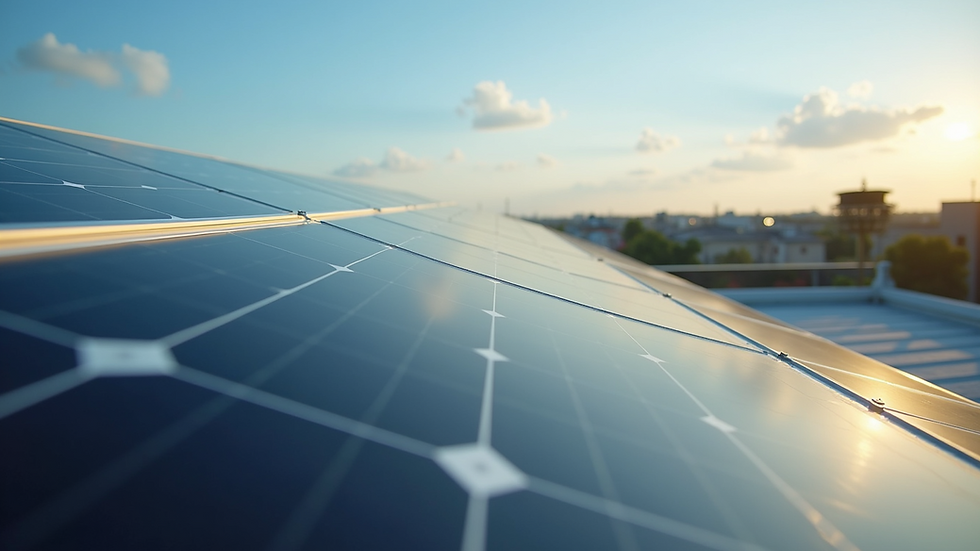Understanding Solar Panel System Costs and ROI in Maharashtra
- Falcon Solar
- Sep 1, 2025
- 4 min read
The adoption of solar energy has gained significant momentum in Maharashtra, driven by the need for sustainable energy solutions and the rising costs of conventional electricity. As more homeowners and businesses consider solar panel systems, understanding the costs involved and the potential return on investment (ROI) becomes crucial. This guide aims to provide a comprehensive overview of solar panel system costs and ROI in Maharashtra, helping you make informed decisions about your solar energy journey.
The Cost of Solar Panel Systems in Maharashtra
When evaluating the cost of solar panel systems, several factors come into play. The primary components of the cost include the price of solar panels, inverters, installation, and any additional equipment such as batteries or mounting systems.
1. Solar Panel Prices
The price of solar panels has decreased significantly over the past decade. In Maharashtra, the average cost of solar panels ranges from ₹30,000 to ₹50,000 per kilowatt (kW). The total cost will depend on the size of the system you choose. For instance, a typical residential system of 5 kW may cost between ₹1.5 lakh to ₹2.5 lakh.
2. Installation Costs
Installation costs can vary based on the complexity of the installation and the location of your property. On average, installation costs in Maharashtra can range from ₹15,000 to ₹25,000 per kW. This means that for a 5 kW system, installation could add an additional ₹75,000 to ₹1.25 lakh to your total cost.
3. Additional Equipment
If you opt for a battery storage system to store excess energy, this will add to your overall costs. Battery prices can range from ₹50,000 to ₹1 lakh, depending on the capacity and brand. Additionally, mounting structures and other accessories may incur further costs.
4. Government Subsidies and Incentives
The Maharashtra government offers various subsidies and incentives to promote solar energy adoption. Homeowners can benefit from a subsidy of up to 40% on the cost of solar panel systems, significantly reducing the overall investment. It is essential to stay updated on the latest government policies to maximize your savings.
Calculating the ROI of Solar Panel Systems
Understanding the ROI of your solar panel system is vital for assessing its financial viability. The ROI is calculated based on the savings on electricity bills, the initial investment, and the lifespan of the solar panels.
1. Savings on Electricity Bills
One of the most significant benefits of installing solar panels is the reduction in electricity bills. In Maharashtra, the average electricity tariff is around ₹7 to ₹10 per unit. A 5 kW solar system can generate approximately 20 units of electricity per day, leading to monthly savings of ₹1,400 to ₹2,100. Over a year, this translates to savings of ₹16,800 to ₹25,200.
2. Payback Period
The payback period is the time it takes for your savings to equal your initial investment. For a 5 kW system costing ₹2 lakh (after subsidies), with annual savings of ₹20,000, the payback period would be around 10 years. This means that after 10 years, you will have recouped your investment, and the remaining years will be pure savings.
3. Lifespan of Solar Panels
Most solar panels come with a warranty of 25 years, and many continue to operate efficiently beyond this period. This longevity means that after the payback period, homeowners can enjoy significant savings for many years, enhancing the overall ROI.
4. Increase in Property Value
Investing in solar panels can also increase the value of your property. Homes with solar energy systems are often more attractive to buyers, leading to a higher resale value. Studies have shown that homes with solar panels can sell for 4% to 6% more than comparable homes without solar.
Factors Influencing ROI
While the above calculations provide a general idea of ROI, several factors can influence the actual returns on your solar investment.
1. Location and Sunlight Exposure
The amount of sunlight your property receives directly impacts the efficiency of your solar panels. Areas with higher solar irradiance will generate more electricity, leading to greater savings and a shorter payback period.
2. Energy Consumption Patterns
Your energy consumption habits also play a crucial role in determining ROI. Homes with higher electricity usage will benefit more from solar installations, as they can offset a larger portion of their electricity bills.
3. Maintenance Costs
While solar panels require minimal maintenance, occasional cleaning and inspections are necessary to ensure optimal performance. Budgeting for these costs is essential when calculating ROI.
Conclusion
Investing in a solar panel system in Maharashtra can be a financially sound decision, offering significant savings on electricity bills and a favorable return on investment. With the decreasing costs of solar technology and the availability of government incentives, now is an opportune time to consider making the switch to solar energy.
By understanding the costs involved and the potential ROI, homeowners and businesses can make informed decisions that align with their financial goals and sustainability objectives. As Maharashtra continues to embrace renewable energy, solar power stands out as a viable solution for a greener and more sustainable future.






Comments